Keeping your hands clean is one of the most important steps you can take to protect yourself and others from getting sick. In fact, according to the Centers for Disease Control and Prevention (CDC), hand hygiene is the single most effective way to prevent the spread of infectious diseases (reference). However, many people do not clean their hands properly or frequently enough, which can increase the risk of infection. In this article, we will explore some simple steps you can take to keep your hands clean and healthy.
Why is hand hygiene important?
Before we dive into the tips, let’s understand why hand hygiene is so important. Our hands come into contact with millions of germs every day, from touching surfaces to interacting with other people. If we do not wash our hands regularly, these germs can accumulate on our skin and potentially enter our bodies through our nose, mouth, or eyes. This can lead to undesirable diseases, such as common colds, influenza, and COVID-19.

The basics of hand hygiene
The CDC recommends washing your hands with soap and water for at least 20 seconds. However, many people may not be aware of the proper technique for hand washing. Here are the basic steps to follow:
- Wet your hands with clean running water, either warm or cold.
- Apply soap and lather your hands by rubbing them together, making sure to get the soap on the backs of your hands, between your fingers, and under your nails.
- Scrub your hands for at least 20 seconds. Need a timer? Hum the “Happy Birthday” song from beginning to end twice.
- Rinse your hands thoroughly under clean running water.
- Dry your hands using a clean towel or air dry them.
When to wash your hands
Washing your hands regularly is essential, but it’s also important to know when to do it. Here are some situations where you should always wash your hands:
- Before and after preparing food, especially raw meat or poultry.
- Before eating or drinking.
- After using the toilet or changing a diaper.
- After blowing your nose, coughing, or sneezing.
- After touching an animal, animal feed, or animal waste.
- After handling garbage.
In addition to these situations, you should also wash your hands whenever they look dirty or feel sticky.

Hand Sanitizers
While washing your hands with soap and water is the best way to remove germs, it’s not always possible to do so, especially when you’re on the go. In these situations, hand sanitizers can be a good alternative. However, not all hand sanitizers are created equal. Look for a hand sanitizer that contains at least 60% alcohol and follow these steps for proper use:
- Apply the hand sanitizer to the palm of your hand.
- Rub your hands together, making sure to get the sanitizer on all surfaces of your hands, and fingers and thumbs.
- Continue rubbing your hands together until the sanitizer is completely dry.
Other tips for keeping your hands healthy
In addition to washing your hands and using hand sanitizers, there are other steps you can take to keep yourself healthy:
- Avoid touching your face, especially your nose, mouth, and eyes.
- Cover your nose and mouth with a tissue when you cough or sneeze, and dispose of the tissue immediately.
- Avoid close contact with people who are sick.
- Clean and disinfect frequently touched objects and surfaces, such as doorknobs, light switches, and keyboards.
Keeping your hands clean is a simple but essential step in preventing the spread of infectious diseases.




